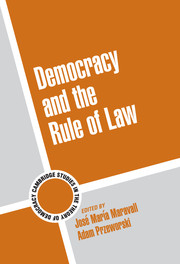Book contents
- Frontmatter
- Contents
- List of Contributors
- Acknowledgments
- Introduction
- Part I
- 1 Lineages of the Rule of Law
- 2 Power, Rules, and Compliance
- 3 Obedience and Obligation in the Rechtsstaat
- 4 A Postscript to “Political Foundations of Democracy and the Rule of Law”
- 5 Why Do Political Parties Obey Results of Elections?
- Part II
- Part III
- Author Index
- Subject Index
4 - A Postscript to “Political Foundations of Democracy and the Rule of Law”
Published online by Cambridge University Press: 09 November 2009
- Frontmatter
- Contents
- List of Contributors
- Acknowledgments
- Introduction
- Part I
- 1 Lineages of the Rule of Law
- 2 Power, Rules, and Compliance
- 3 Obedience and Obligation in the Rechtsstaat
- 4 A Postscript to “Political Foundations of Democracy and the Rule of Law”
- 5 Why Do Political Parties Obey Results of Elections?
- Part II
- Part III
- Author Index
- Subject Index
Summary
Maravall and Przeworski open this book with a difficult question: why do governments act according to laws? The fact that so many governments, both contemporary and historical, have difficulty doing just this indicates that the answer is not obvious. The principal argument of this book is that the force of law is not normative – citizens and political officials do not obey law because of a duty to obey law. Instead, political officials obey the law because they have incentives to do so.
Maravall and Przeworski fill out this logic. For example, they suggest that the constitution is important for the rule of law. “But the constitution matters not because governments feel a duty to obey it. Rather, it serves as a focal device, enabling particular individuals to guess what others will consider as major transgressions and thus to agree when to act.” To police the behavior of government officials, “Actions of groups with different interests must be coordinated.”
Maravall and Przeworski emphasize another important aspect of the rule of law, that “laws inform people what to expect of others…. At the same time, [laws] facilitate coordination of sanctions against a government that deviates from its own announcements. In this sense, publicly promulgated rules provide an equilibrium manual.” They note that “laws indicate to citizens when to act against the government. By coordinating expectations, they facilitate collection actions that impose sanctions on governments.”
In short, one answer to Maravall and Przeworski's question is that political officials obey the law because not doing so puts their political future at risk.
- Type
- Chapter
- Information
- Democracy and the Rule of Law , pp. 109 - 113Publisher: Cambridge University PressPrint publication year: 2003
- 11
- Cited by

